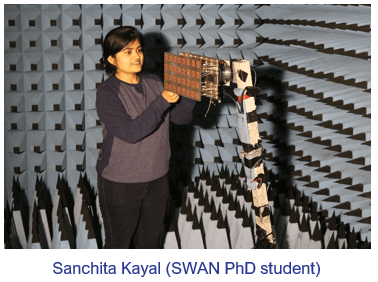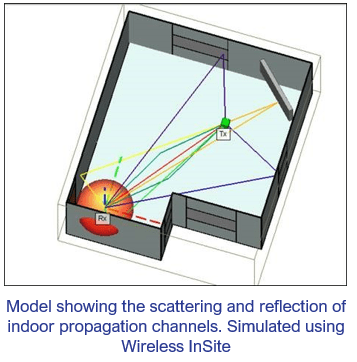Joining the SWAN team at the University of Bristol in September 2022, EPSRC funded PhD student Sanchita Kayal has been busy building up her research project looking at joint antenna and propagation design and optimisation for secure communications through the wireless channel. In our latest spotlight on research blog we asked Sanchita a few questions about her project so far and her plans for the future.
 What is the key focus of your PhD and how does this relate to SWAN?
What is the key focus of your PhD and how does this relate to SWAN?
My research focus is to identify an appropriate signal modelling scheme that will provide security for the wireless data transmission and its device based realisation. It includes modulation techniques, control of signal polarisation and direction to obtain resilience against physical attacks like eavesdropping and jamming. I will also be working with the metamaterial paradigm for the implementation of transmitting and receiving antennas that will essentially support adapted methodology to achieve secured transmission.
Can you give us a brief overview of the work you have been doing recently?
I am currently doing an experiment with a general MIMO array to analyse how received signal gets affected by common propagation channel factors, such as reflections and scattering due to different polarisation states of the transmitted signal. I will also be analysing how the data reception is affected when the position of the receiver deviates from boresight alignment.
What will be the key outputs of this particular piece of work?
This experiment will help me to identify how polarisation can be taken into account when developing techniques to enhance secure data transmission.
What are the next steps for this section of your research?
I can simulate antenna design with the help of data obtained from this work, which will leverage signal modelling according to the adapted scheme.
Can you tell us of one recent publication in the world of communications systems and networks research that has interested you?
2021. Huang, J. Zhang, Q. Cheng, and T. Cui, “Polarization modulation for wireless communications based on metasurfaces,” Advanced Functional Materials, vol. 31, Sep. 2021. DOI: 10.1002/adfm.202103379.
To the best of my knowledge, only this work exhibits a practical demonstration of polarisation modulation.
Is there anything else you would like to tell us?
Overall aim of this research work is to model a more secured wireless data transmission method using modulation/channel model and frontend device design. The system performance of the designed model will then be validated though practical measurement.
SWAN Prosperity Partnership
SWAN is an EPSRC Prosperity Partnership project dedicated to the creation of Secure Wireless Agile Networks (SWAN) that are resilient to both cyber attacks and accidental or induced failures. The partnership is made up of contributors from the Smart Internet Lab at the University of Bristol, Toshiba Research Europe Ltd, GCHQ, and Roke Manor Research Ltd.
Interested in reading more about SWAN and our programme of research? Take a look at our website for more information or sign up to our newsletter for regular updates on SWAN activities and opportunities to get involved.
